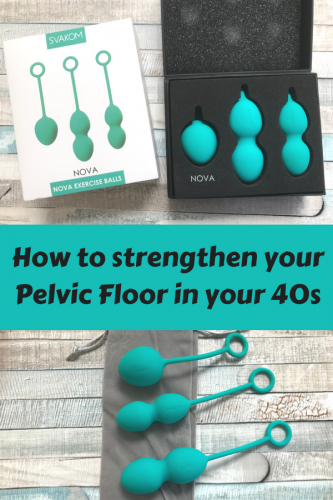When I get together with some of my closest mum friends, the conversation generally lurches from holidays and skin care, to things we wouldn’t discuss with anyone else. One of these hot topics is incontinence, apparently trampolines are the trigger for most of my friends. It’s a fate I am keen to avoid. I’m not at that stage yet, but I’m keen to keep my pelvic floor in good health.
When I was pregnant, my pregnancy yoga teacher really drummed into us the importance of doing our pelvic floor exercises. She used to suggest we did them while waiting for traffic lights to change, or when certain adverts came on. Eight years later I’m still doing them when I hear the Go Compare advert. The trouble is, I’ve never been sure if the pelvic floor exercises I’ve been doing were correct, or if they were effective.

Now I’m in my early 40’s I’ve started to make a few changes to try to keep myself healthy and fitter than I have been in recent years. The menopause will hit within the next ten years, so I want to try to make sure my reproductive health is as good as it can be. Part of that is having a stronger than strong pelvic floor. I decided my usual exercises weren’t enough, so I ordered a set of Kegel balls from Sent to Thrill.
Sent to Thrill was set up by a mum of 3 young children. She struggled to find products that would help her. Sent to Thrill began as a search for a product to help improve pelvic floor strength and they realised that good pelvic floor is the first step on a journey to increased body confidence and improved sexual health.
The Svakom Nova Kegel Balls cost £36 and include full instructions and a velvet bag to keep them safely stored away. There are three kegel balls included in the set; a single ball (49gm), a double ball (75gm) and another double ball (95gm).
They are made from body-safe silicone and they are phthalate-free and they are 100% waterproof. I chose them because they had a silicone “string” attached which I felt would make them easy to insert and remove after use.

The instructions are very clear. They suggest using them for half an hour a day while you are active; that is stood up and doing something. They will be considerably less effective if you’re sat down or lying down. I decided to start with the smallest ball and to wear it for the half an hour it takes for me to shower, brush my teeth, blow dry my hair and sort my clothes out for the day.
The instructions suggest using the smallest ball for 30 days; then increasing the size for another 30 days and then moving onto the heaviest Kegel ball. I have used this set for a couple of weeks now. I’m still using the smallest ball but it’s very comfortable and I doesn’t feel intrusive. I wear it for around half an hour a day and it’s not until I’ve removed it that my pelvic floor muscles ache gently and let me know they’ve done some work.
Your pelvic floor muscles support your bladder, bowel and womb; keeping your muscles in good condition can help prevent prolapse and incontinence. Having a strong pelvic floor can also help to improve your sex life and can give you stronger orgasms.

There’s no bad time to start exercising your pelvic floor. You are usually advised to exercise during pregnancy and afterwards. But the sooner you start, the stronger your pelvic floor will be. If we all did our pelvic floor exercises, or used Kegels, then we could stave off the threat of incontinence for much longer, maybe even forever.
For more information about pelvic floor exercisers, visit the Sent to Thrill website.

